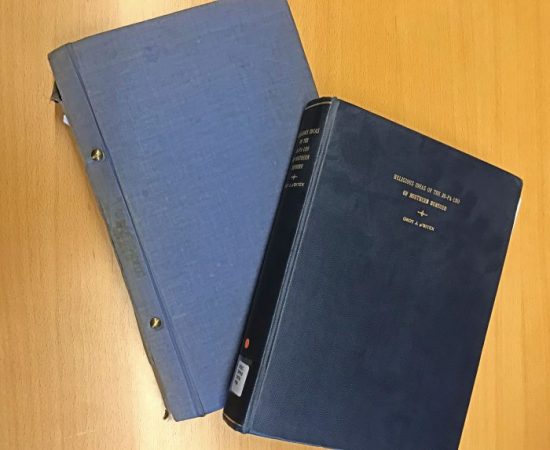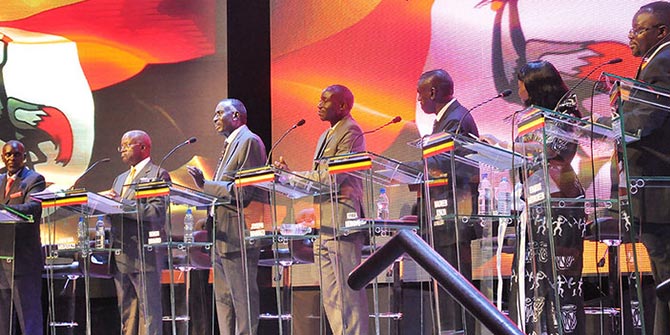The republication of Okot p’Bitek’s seminal yet largely forgotten anthropological works comes at a time when the Acholi people of Uganda, in the aftermath of a twenty-year war, are looking back to discover their precolonial and colonial cultural history. Tim Allen frames the historical and political context of this work which would later shape modern anthropology.
For the full introduction to Lawino’s People: The Acholi of Uganda please see here.
Okot p’Bitek is one of the most famous of all African creative writers. His great epic poem, The Song of Lawino, is hailed as a masterpiece of world literature. Yet his important prose writings, especially his anthropological studies of his own Acholi people, have been overlooked. They are well worth reading, not least because their arguments have in recent years been associated with the ‘Rhodes Must Fall’ agenda.
In 1960, Okot p’Bitek arrived in Oxford to study with some of the founding figures of British Social Anthropology, including E.E. Evans-Pritchard and Godfrey Lienhardt. He was outraged by what he confronted. Although he had friendly personal relations with his teachers, he found the attitudes of staff and visiting lecturers offensive. He strongly objected to use of terms like ‘primitive’ and ‘savage’, rejected misleading categorisations of Africans in terms of ‘tribes’, and was highly critical of attempts to interpret African religions and philosophies in terms of European and Christian ideologies. In his view, anthropology and Western scholarship in general was imbued with colonial values and was demeaning.
His critical attitude made him a very unconventional student at the time. But he was unconventional in other ways too. He had qualified in Uganda as a secondary school teacher, but was good at football. He came to England for the first time in 1956 as a member of the Uganda Cranes team that played most games barefoot. They caused a sensation when they beat the Great Britain Olympic team, but by that point in the tour p’Bitek had moved on. He wanted to go to university, and managed to find a course at Bristol which then enabled him to study law at Aberystwyth. He also spent a period at the International Court of Justice in The Hague before ending up at Oxford.
At Oxford’s Institute of Social Anthropology he initially wrote a B.Litt dissertation on Acholi songs, and then embarked on a D.Phil. It has sometimes been suggested that he had been awarded one. It is, for example, reported that he told an interviewer he had travelled to Oxford in 1967 to present a D.Phil thesis on African religion. However, p’Bitek’s long-time friend and fellow poet, Taban Lo Liyong, who published his own translation of p’Bitek’s original Acholi language version of Song of Lawino in 2001, bluntly asserted in the introduction: ‘Okot read anthropology at Oxford. They denied him the D.Phil’.
Records held at p’Bitek’s Oxford College, St Peter’s, and in the Oxford archives, confirm that Lo Liyong is correct, and also that p’Bitek did attend a viva in 1967. He submitted his D.Phil thesis twice. The first time was in Michaelmas Term of that year, but the examiners deemed it needed further work, so referred it back.
Those examiners were Evans-Pritchard and the linguist A.N. Tucker. In their examiners’ report, they gave four reasons for not passing the thesis: it had too many typing, spelling, grammatical and other errors; it was not clear what p’Bitek had seen himself, and what had been told to him; it was impossible to know from the thesis what are currently beliefs and practices and what were in the past; and that the thesis was not on the approved topic. The last point relates to the fact that the subject approved by the board of the faculty was ‘Religious ideas of the Jopalwo of Northern Bunyoro’. That was not what p’Bitek had written about. Nevertheless, the examiners emphasised the important ethnographic information in the thesis, and recommended that p’Bitek be allowed to resubmit, and be excused from a second oral examination.
According to documents in his college file, p’Bitek’s whereabouts then became uncertain. It was reported that he had left his native Uganda in 1968, and his supervisor in the Institute of Social Anthropology (i.e. Godfrey Lienhardt) had lost contact with him. This was the time when p’Bitek was forced into exile following the publication of Song of Lawino. The poem was being widely read, and its scathing criticisms of corrupt elites and the betrayal of hopes at independence had infuriated Ugandan politicians and other influential figures, such the dangerous army commander Idi Amin (who would later seize power in a coup). In July 1969, a letter was sent to p’Bitek’s new address in Kisumu, Kenya, informing him that he had a final three terms during which to resubmit his revised thesis. He subsequently made this deadline, and his thesis was re-submitted in May 1970.
___________________________Someone said
___________________________Independence falls like a bull
_______________________________buffalo
___________________________And the hunters
___________________________Rush to it with drawn knives,
___________________________Sharp shining knives
___________________________For carving the carcass.
___________________________And if your chest
___________________________Is small, bony and weak
___________________________They push you off,
___________________________And if your knife is blunt
___________________________You get the dung on your
_______________________________elbow,
___________________________You come home empty-handed
___________________________And the dogs bark at you!
_________________________– Okot p’Bitek, extract from Lawino’s People
Two different examiners, W.H. Whiteley and Jean Buxton, assessed the new thesis in October of that year. It was at this moment that Evans- Pritchard retired from his position in the Institute, which may have had an effect on the decision to refer it for a second time. The examiners took the view that p’Bitek had insufficiently addressed the points raised in the first viva, and they did not like the map he had included or his treatment of vernacular terms. They also again pointed out that the thesis did not focus on the approved title (‘unless North Bunyoro is defined in very elastic terms indeed’). In the examination, their recommendation was not accepted, and p’Bitek’s leave to supplicate was refused outright by the Anthropology and Geography Faculty Board on 30 November 1970. No explanation is given as to why this was the case.
P’Bitek’s failed D.Phil is on a shelf in Oxford’s Tylor Anthropology Library, smartly bound, with the approved title embossed in gold: Religious Ideas of the Jopa- Luo of Northern Uganda. P’Bitek was not required to be present at the second examination, and the manuscript had been sent by air mail from the United States, where p’Bitek was based in 1969 and 1970 at the State University of Iowa. It has faults, but it is a fascinating, and very readable, discussion of the spiritual ideas of the Luo-speaking groups of Uganda, with most of the material dealing with the Acholi. P’Bitek makes clear that the text is not about Bunyoro in any significant way. It seems bizarre that he was not allowed simply to change the title.
Perhaps by this point p’Bitek was beyond caring. He had become a well-known author, and was being hosted at universities in the United States. In any case, he published a lightly edited version of his thesis in 1971, The Religion of the Central Luo, alongside another book about his experiences in Oxford, African Religions in Western Scholarship. Of the former, Aidan Southhall wrote: ‘Here is the beginning of that presentation of African culture by Africans, for Africans, as well as for the world of foreign scholarship, without apology or dissimulation, for which we have been waiting so long.’ Of the latter, Ali Mazrui observed: ‘Here surely is Africa’s indignation at its most eloquent.’

Both books were published in Nairobi by a Kenyan publisher, signifying p’Bitek’s commitment to African-based outputs for scholarship by Africans. Sadly, p’Bitek’s expectations for the expansion of such an approach have not taken hold, and that largely explains why these two seminal works have not had the attention they deserve.
African Religions in Western Scholarship (1971) contains many passages in which p’Bitek expresses his disdain for theories he was taught. At various points, he attacks particular scholars by name and asserts that the whole discipline of social anthropology is little more than a colonial instrument to ensure effective control and exploitation. He asks:
Is there a place for social anthropology in an African university? In my opinion the answer is, no. The departments of social anthropology in African universities were campaigning grounds for Western anthropologists. African universities can ill-afford to maintain these bases. Africans have no interests in, and cannot indulge in perpetuating the myth of the “primitive”.
However, elsewhere in the same book, p’Bitek cites publications by anthropologists in ways that suggest he agrees with some of their insights, and he does seem to have actually learned quite a bit from them. He thanks Evans-Pritchard and Godfrey Lienhardt for their personal friendship, and for the ‘challenge’ they threw at him. Also, accounts of his life in Oxford by those who were there at the time suggest that he was much liked, especially by Evans-Pritchard and Lienhardt. They were regularly seen together, drinking and having fun in local pubs. It is clear that he was not intimidated by them, but basically treated them as equals, with whom he might socialise, and with whom he might debate.
His disdain for some analytical perspectives, however, did not prevent him engaging with what was useful. His anthropological writings are certainly unconventional for their time. Nevertheless, The Religion of the Central Luo (1971) surely owes an unacknowledged debt to Evans-Pritchard’s Witchcraft Oracles and Magic (1937) and is pitched as a critique of both Evans-Pritchard’s Nuer Religion (1956) and Godfrey Lienhardt’s Divinity and Experience (1961). Interestingly, the latter two books were written after their authors had converted to Catholicism – in contrast to Okot p’Bitek, who was in revolt against Christianity (with particular ire focused on Catholicism) as a colonial and missionary imposition.
Moreover, if it is the case that writings by social anthropologists were, in fact, a significant influence on Okot p’Bitek, the reverse was probably the case too. In p’Bitek’s late essay, ‘African Aesthetics – The Acholi Example’, he is, in retrospect, rather more affectionate about Evans-Pritchard, and suggests that the two of them had frank discussions about African customs in regard to lovemaking. In a section describing the sexually charged songs sung by couples in ‘love dances’ and ‘get-stuck’ dances, he mentions that:
My old teacher, Professor E. E. Evans-Pritchard, used to attend these youthful dances at night among the Shilluk. In the spirit of the social anthropologist he had to be naked, as everybody else was. But he always carried a torch. When two lovers left the arena for the nearest private spot, he would follow them, his torch blazing. The Welsh fellow got a thorough beating one night; it left large scars on his legs.
Perhaps significantly, Evans-Pritchard’s articles on Azande sex practices, written towards the end of his life, suggest a reassessment of this kind of research. They are remarkably explicit:
Nothing is so disappointing to a Zande as to lie with a woman who has what they call a large watery vagina so that in the backwards and forwards and rotary movements of the sex act the penis keeps on slipping out. They like a vagina which is what they call sticky and small, which is difficult to enter, and which grips the penis firmly when entrance has been effected.
Is it unreasonable to suppose the Evans-Pritchard had been reading Okot p’Bitek’s Acholi Love (1964) and other publications, including Song of Lawino? However, if he had, neither he, nor Godfrey Lienhardt, were willing, or able, to ensure that p’Bitek was awarded a D.Phil. Failing the thesis of such an important author, largely because of its title, was not the finest moment for anthropology at Oxford!
See more information here about the republication of Lawino’s People by Okot p’Bitek and Frank Knowles Girling, with an introduction by Professor Tim Allen.
Photo: A painting of Okot p’Bitek by Ivan Okot on the wall of the TAKS Cultural Centre in Gulu, Uganda. Credit: Tim Allen.






Carefully written article with amazing detail.
It’s a great article which throws new light for researchers on Okot. I personally did not know that Okot had submitted a thesis for PhD besides the B.’Phil which I have seen a copy in the University of Nairobi Library. Perhaps the wife knew of the submission and assumed that Okot was awarded as she often refers to him as Dr Okot p’Bitek. Thanks Tim for this insightful article.
An Admirer of p’Bitek & his literal works from Kenya.
Very insightful article. Brings the no nonesense character of the ‘Dr’ Okot p’Bitek alive today.
Does it mean that the fate of his D.Phil. is a done deal sealed by his own two friends (Evans-Pritchard & Godfrey Lienhardt) that there is no one at Oxford or elewhere to change the “title” so that Okot p’Bitek can finally be awarded his elusive and worthy D.Phil. posthumously one day? Kudos Tim Allen for this most crucial update.
As an Acholi living in Uganda I can confirm that the title “…Jopalwo of northern bunyoro” is not fitting at all. I can see the struggle p’Bitek went through in order to make his thesis have the right title. But the challenge could have been that he was trying to convince people who had never visited Uganda or who intentionally refused to listen to his plea due to their own interests. Okot’s title “Jopa-Luo of Northern Uganda” makes more sense from a geographical and cultural perspective. ‘Jopa- Luo’ or ‘Jopalwo’ means “people of Luo/lwo” or “Luo people”. So “Jopalwo of northern bunyoro” would mean “Luo people of northern bunyoro”. Which is very wrong. It would imply that there is a small group of luo community living within in the northern part of Bunyoro. It is similar to saying “the Scots of northern Newcastle” in trying to describe the culture of entire Scotland people. Bunyoro is in Western Uganda. Yes, some part of the Luo is located north of Bunyoro (using compass direction) but majority would fall North-East including the Langi in Lira, Dokolo and Acholi in Pader, Kitgum and Lamwo. For sure it is not fair to say “…Jopalwo of northern bunyoro”. I wonder who approved the title and whether p’Bitek had accepted it from the start. If the title was the main reason for rejecting his thesis then that was not fair. I wonder if the doctorate can be awarded posthumous
Thank you Allen for highlighting the ongoing violent and injustices the Acholi people. Okot is one of the greatest men of his era who put themselves head to head with colonial violent structures and injustices. Evidently, that for those who try to challenge those violent structures, as Okot did, in many ways they were demonised, silenced, suffocated and Okot certainly is one of them. Over six decades later, we are still learning their excruciating experiences. No one should be alluded that those violent structures have not gone way; they are passed on to the next generation. Because the violences are well embedded into the systems of education, employment, health and judicial systems, political and other sectors such as film industries. In education, we all know how black people are disproportiontely disadvantage, and suffer inequalities compare to their counterpart white people. Both in education institutions, and at work place black people are constantly told or perceived as not good enough. At universities, particularly black students are subjected to those colonial attitudes, unconscious bias, discriminations by their supervisors who frustrate, demoralise and humiliate them to their mercies. Despite in the heart of universities marketing strategies diversity is the magic alluring word. But the realities are that their work are perceive as unconventional, unprofessional, and do not meet standard, or not interesting piece of work among the least.